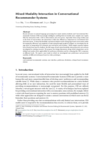An Instrument for measuring users’ meta-intents
Ma, Y., Donkers, T., Kleemann, T., & Ziegler, J. (2023). In J. Gwizdka & S. Y. Rieh (Eds.), CHIIR ’23: Proceedings of the 2023 Conference on Human Information Interaction and Retrieval (pp. 290–302). ACM.
Abstract
We propose the concept of meta-intents which represent high-level user preferences related to the interaction and decision-making in conversational recommender systems (CRS) and present a questionnaire instrument for measuring meta-intents. We conducted a two-stage user study, an exploratory study with 212 participants on Prolific, and a confirmatory study with 394 participants on Prolific. We obtained a reliable and stable meta-intents questionnaire with 22 question items, corresponding to seven latent factors (concepts). These seven factors cover important interaction preferences and are closely related to users’ decision-making process. For example, the factor dialog-initiative reflects whether users prefer to follow the system’s guidance or ask their own questions in a CRS. We conducted statistical analyses of meta-intents in two domains (smartphones and hotels), and a general chatbot scenario. We also investigated the influence of additional factors (demography, decision-making style) on meta-intents through Structural Equation Modeling (SEM). Our results provide preliminary evidence that the proposed meta-intents are domain and demography (gender, age) independent. They can be linked to the general decision-making style and can thus be instrumental in translating general decision-making factors into more concrete design guidance for CRS and their potential personalization. Meta-intents also provide a basis for future analyses of interaction behavior in CRS and the development of a cognitively founded theoretical framework.


